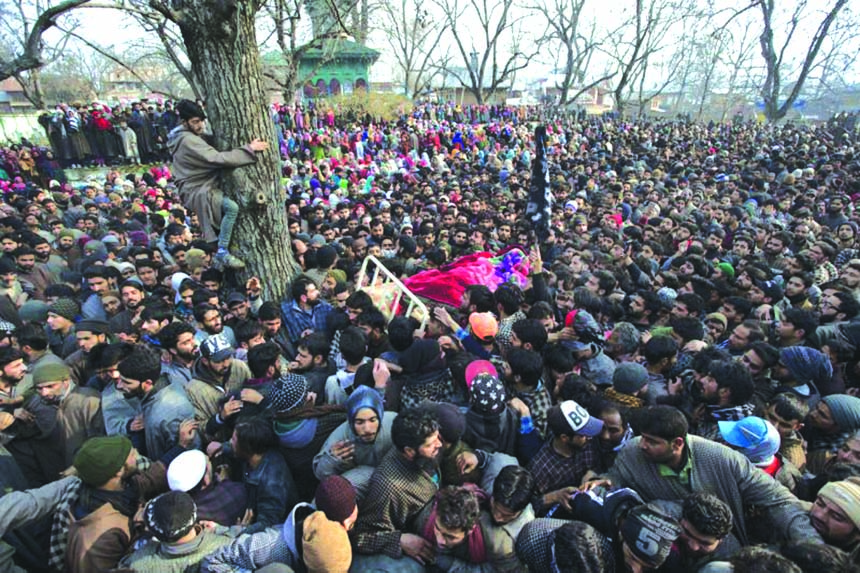
AP, Srinagar, India :
A gunbattle between Indian troops and Kashmiri rebels early Saturday left six militants dead and triggered a new round of anti-India protests in the disputed Himalayan region.
The fighting began after government forces came under fire during a raid on a militant hideout in the southern Tral area, according to police. Troops retaliated and six militants were killed in the brief exchange of fire, police said.
As the news of the killings spread, hundreds of civilians took to the streets in Tral town, clashing with government forces at several places. No injuries were immediately reported.
In a separate incident, India’s army accused rival Pakistan of opening fire in the Keran sector of Kashmir and killing two Indian army officers on Friday.
The Indian army called the firing a violation of the 2003 cease-fire accord between the nuclear-armed rivals, who both claim the divided territory of Kashmir in its entirety.
Pakistan did not comment on the Indian allegations. In the past, each country has accused the other of initiating the firing and violating the cease-fire agreement.
Rebels have been fighting Indian control since 1989. Most Kashmiris support the rebel cause that the territory be united either under Pakistani rule or as an independent country.
India accuses Pakistan of arming and training the rebels, a charge Pakistan denies. Nearly 70,000 people have been killed in the uprising and the ensuing Indian military crackdown.
Soldiers and police fanned out across Indian-controlled Kashmir on Monday to enforce a security lockdown for a second straight day to stop anti-India protests and foil a call by separatists for a march toward India’s main military garrison in the disputed region.
Government forces patrolled streets in the region’s main city of Srinagar and sealed off all the roads leading to India’s military garrison in the city.
Three Kashmiri leaders, known as the Joint Resistance Leadership, or JRL, called for Kashmiris to march to the army cantonment to protest the killings of seven civilians and three rebels during an Indian counterinsurgency operation over the weekend.
Police and paramilitary soldiers in riot gear and carrying automatic rifles laid steel barricades and coiled razor wire on roads and intersections to cut off neighborhoods in a bid to stop protests.
Defying restrictions, dozens of activists, some wearing symbolic shrouds imprinted with the words: “Indian army, kill us all,” marched in Srinagar’s main business hub. Police detained Mohammed Yasin Malik, one of the leaders of the JRL, and about half a dozen others, leading to scuffles and clashes during which troops fired tear gas and protesters threw stones, police said.
Authorities also stopped train services and suspended internet on cellphones in the region, a common tactic to make organizing protests more difficult and stop dissemination of protest videos by Kashmiris.
Shops and businesses in other areas with no security restrictions closed in a show of solidarity with those protesting Indian rule.
The killings and injuries of more than three dozen civilians on Saturday angered Kashmiris and sparked protests and clashes at several places in the region. Residents accused troops of directly spraying gunfire into the crowds and killing at least two civilians, including a teenage student, away from the battle site.
Police said in a statement that they regretted the killings but that the protesters had come “dangerously close” to the fighting.
Separatists who challenge India’s sovereignty over Kashmir said the killings were part of India’s state policy and called for three days of mourning and a general shutdown in Kashmir apart from Monday’s public march.
The Indian army has appealed for people to not heed the call. The army said in a statement that it was “fighting terrorism and proxy war sponsored by Pakistan and its proxies in Kashmir,” adding that its objective “is to bring peace and normalcy” in Kashmir.
Meanwhile, Pakistan’s army spokesman Maj. Gen. Asif Ghafoor condemned what he called “state sponsored terrorism” by Indian forces in Kashmir, saying “bullets can never suppress unarmed brave freedom fighters.”
He said on Twitter that the “Indian Army must respect ethics of professional soldiering.”
India and Pakistan each administer part of Kashmir, but both claim the region in its entirety. Rebels have been fighting Indian control since 1989. Nearly 70,000 people have been killed in the uprising and the ensuing Indian military crackdown.
Kashmiris deeply resent Indian rule and support the rebels’ call that the territory be united either under Pakistani rule or as an independent country.
In recent years, mainly young Kashmiris have displayed open solidarity with the rebels and sought to protect them by engaging troops in street clashes during India’s counterinsurgency operations despite repeated warnings from Indian authorities.

